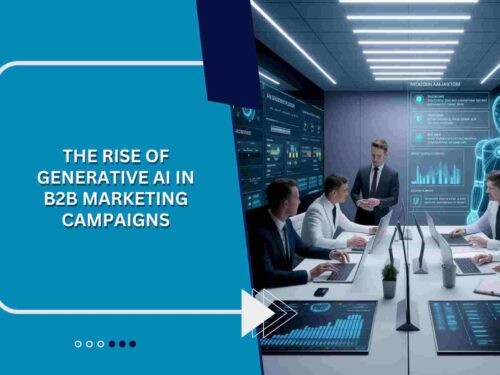In today’s fast-evolving digital landscape, B2B companies are navigating an increasingly complex and competitive marketplace. Buyers are more informed, journeys are longer, and expectations are significantly higher. As B2B organizations strive to stay relevant and engaging, one strategy has emerged as a game-changer Omnichannel Marketing.
Unlike traditional or multichannel strategies, Omnichannel Marketing focuses on delivering a consistent, personalized experience across all customer touchpoints digital and physical alike. Whether a prospect visits your website, interacts on LinkedIn, opens an email, or talks to your sales team, the journey must be seamless and unified.
The B2B buying process often involves multiple decision-makers, extended research phases, and highly personalized content. In this environment, Omnichannel Marketing not only enhances engagement but also boosts trust, conversion, and long-term loyalty. It’s no longer a luxury Omnichannel Marketing is essential for sustainable B2B growth.
The Shift in B2B Buyer Behavior
Modern B2B buyers expect experiences that are just as smooth and tailored as those in the B2C world. Thanks to the consumerization of B2B, decision-makers now conduct independent research across various channels before ever engaging with a sales rep.
Buyers jump between platforms researching on a desktop, watching webinars on a tablet, and scrolling through LinkedIn insights on their mobile phones. Omnichannel Marketing enables B2B companies to stay visible, relevant, and consistent across all these interactions.
According to industry reports, over 70% of B2B buyers fully define their needs before engaging with a sales rep. And nearly 60% prefer not to interact with sales at all. That makes it crucial for businesses to create an omnichannel presence that educates, nurtures, and converts without direct human intervention.
Consistency Builds Trust
Trust is the cornerstone of any successful B2B relationship. When messaging and branding are inconsistent across platforms, it creates confusion and damages credibility. Omnichannel Marketing solves this challenge by aligning communications across every channel and device, ensuring a cohesive brand experience.
A consistent message reassures prospects, reinforces brand identity, and strengthens professional perception. When a prospect reads your blog, sees your ad on LinkedIn, then receives a personalized email all with aligned messaging and tone they begin to trust your expertise and value proposition.
B2B buyers are not just evaluating your product or service they’re assessing your reliability. Omnichannel Marketing helps position your brand as organized, dependable, and forward-thinking.
Streamlining the Buyer’s Journey
The B2B buyer journey is no longer linear. It involves multiple channels, stakeholders, and decision points. Without a unified strategy, prospects can easily get lost, disengage, or fall through the cracks.
Omnichannel Marketing bridges these gaps by creating a continuous, responsive experience. It ensures that no matter where a buyer engages social media, webinars, content hubs, paid ads, or direct sales outreach they are guided smoothly through the funnel with relevant content and contextual messaging.
This synchronization accelerates decision-making, reduces friction, and increases the likelihood of conversion. It’s about guiding the buyer not pushing them and delivering value at every stage of the journey.
Personalization at Scale
Personalization is no longer optional in B2B marketing it’s expected. Buyers want solutions that speak directly to their challenges, industry, and goals. Omnichannel Marketing allows companies to gather data across all touchpoints, which can then be used to personalize future engagements.
By integrating customer data from CRM systems, website behaviors, and email interactions, businesses can segment their audience and tailor messaging accordingly. For example, a prospect who downloaded a whitepaper on AI in logistics can be retargeted with case studies, video content, or webinars specific to supply chain transformation.
Through Omnichannel Marketing, this level of personalization becomes scalable, automated, and highly effective in improving engagement and trust.
Integrating Marketing and Sales Efforts
In B2B organizations, alignment between marketing and sales is crucial. Disconnected efforts often result in missed opportunities, duplicated outreach, or messaging mismatches. Omnichannel Marketing encourages collaboration by aligning both departments under a unified customer journey strategy.
Marketing nurtures leads through content, webinars, social media, and paid ads. Sales then continues the conversation with full visibility into previous interactions. This seamless hand-off not only improves lead quality but also boosts close rates and accelerates the sales cycle.
With tools like marketing automation, CRM integration, and behavior tracking, both teams can operate with real-time data. This data-driven collaboration ensures that no lead is left behind and every touchpoint is meaningful.
Better Data, Better Decisions
One of the greatest advantages of Omnichannel Marketing is the depth and quality of data it provides. When all customer interactions are tracked and analyzed across channels, marketers gain a 360-degree view of the buyer journey.
This data reveals what content resonates, which channels convert, and where users drop off. It also uncovers hidden patterns and buyer intent signals, allowing businesses to optimize strategies and make informed decisions.
Moreover, with AI-driven analytics, companies can predict buyer behavior, identify high-value leads, and personalize campaigns in real time. The insights derived from omnichannel data become a powerful asset for driving performance and ROI.
Adapting to New Technologies and Platforms
The digital landscape is constantly evolving. From new social media platforms to voice search, AI chatbots, and virtual events, B2B marketers must remain agile. Omnichannel Marketing allows organizations to experiment with emerging channels while maintaining a consistent brand narrative.
Instead of building isolated campaigns for each new platform, businesses can expand their omnichannel ecosystem to include them ensuring that the buyer experience remains connected. Whether a buyer interacts with your chatbot, clicks on a YouTube ad, or listens to your podcast, the core messaging remains intact.
This adaptability ensures that your brand remains visible and engaging wherever your audience chooses to spend time.
Improving Customer Retention and Loyalty
Customer acquisition is just one part of the growth equation. Retaining and expanding existing relationships is equally important, especially in B2B industries where long-term contracts and upsell opportunities abound.
Omnichannel Marketing enhances the post-sale experience through ongoing engagement. By using personalized emails, account-based marketing (ABM), loyalty programs, and targeted content, companies can continue to add value long after the initial sale.
Engaging customers across multiple channels fosters stronger relationships, increases satisfaction, and boosts lifetime value. It also provides opportunities for gathering feedback, identifying pain points, and nurturing brand advocates.
Competitive Differentiation in a Crowded Market
As more B2B players enter the market, standing out becomes increasingly difficult. Price and features are no longer the only differentiators customer experience has become a competitive edge. Omnichannel Marketing provides the framework to deliver a superior experience that sets your brand apart.
Companies that invest in unified, personalized, and consistent engagement are perceived as more professional, innovative, and client-focused. This positive perception influences buying decisions and increases the likelihood of referrals and renewals.
Buyers remember experiences. A smooth, engaging, omnichannel journey makes your brand more memorable and desirable.
Supporting Account-Based Marketing (ABM)
ABM is a high-impact B2B strategy that targets specific accounts with tailored campaigns. Omnichannel Marketing is essential for ABM success, as it enables targeted messaging across multiple channels in a coordinated fashion.
For example, a decision-maker from a target company might see a LinkedIn ad, receive a personalized email, download a custom whitepaper, and get a follow-up call from sales all aligned around their industry and challenges. This holistic approach builds stronger relationships and accelerates deal velocity.
Omnichannel execution ensures that every interaction feels relevant, personalized, and strategically aligned with account objectives.
Building a Future-Ready Marketing Strategy
The future of B2B marketing is integrated, automated, and customer-centric. Omnichannel Marketing is the foundation upon which these elements converge. As buyer expectations evolve and technology advances, organizations must design strategies that are flexible, scalable, and insight-driven.
Those who invest in Omnichannel Marketing will not only meet today’s demands but also be prepared for tomorrow’s disruptions. From AI and machine learning to immersive content and voice-driven search, an omnichannel framework provides the agility needed to stay ahead.
Marketers can use automation platforms, advanced analytics, and dynamic content delivery to refine their omnichannel approach continuously. The result is a living, evolving system that keeps pace with modern buyer behavior and business objectives.
To transform your B2B growth strategy with expert-driven omnichannel marketing solutions, connect with the specialists at Acceligize.




